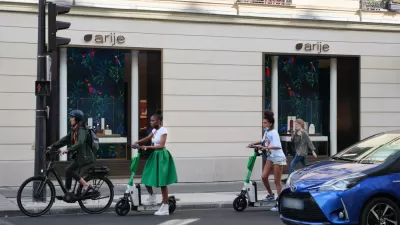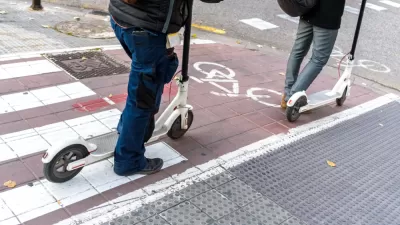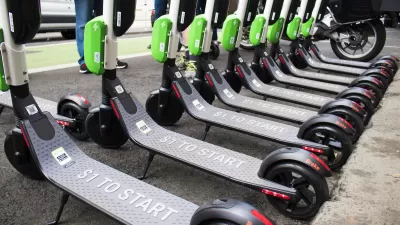Regulations for the operation of electric scooter share in Columbus, Ohio require companies to distribute scooter in low-income neighborhoods. The companies haven't been living up to their part of the deal.

Doug Caruso and Rick Rouan report on a developing controversy in Columbus, where the city is cracking down on electric scooter company Bird, for failing to place 20 percent of its scooters in "opportunity" neighborhoods around the city.
A city administrator sent a violation letter to Bird in April that threatened to impound the company’s scooters if it didn’t start placing 20 percent of its scooters in opportunity neighborhoods as its contract requires. A Dispatch analysis of trip data for March showed that of more than 6,700 Bird trips that month, just 40 started in an opportunity neighborhood.
Bird isn't the only company having a problem meeting the city's requirements.
A look at data that Lime reports to the city shows that the company met the requirement on just 19 days from December through March. Lime’s record improved in late March, when a city official sent an email reminding the company of its responsibilities under the contract.
Lime met the goal between March 23 and March 30, after receiving the letter.
Meanwhile, the city could seize Bird's scooters if the company doesn't clean up its act.
FULL STORY: Scooter companies are slow to move to struggling neighborhoods

Alabama: Trump Terminates Settlements for Black Communities Harmed By Raw Sewage
Trump deemed the landmark civil rights agreement “illegal DEI and environmental justice policy.”

Planetizen Federal Action Tracker
A weekly monitor of how Trump’s orders and actions are impacting planners and planning in America.

How Atlanta Built 7,000 Housing Units in 3 Years
The city’s comprehensive, neighborhood-focused housing strategy focuses on identifying properties and land that can be repurposed for housing and encouraging development in underserved neighborhoods.

In Both Crashes and Crime, Public Transportation is Far Safer than Driving
Contrary to popular assumptions, public transportation has far lower crash and crime rates than automobile travel. For safer communities, improve and encourage transit travel.

Report: Zoning Reforms Should Complement Nashville’s Ambitious Transit Plan
Without reform, restrictive zoning codes will limit the impact of the city’s planned transit expansion and could exclude some of the residents who depend on transit the most.

Judge Orders Release of Frozen IRA, IIJA Funding
The decision is a victory for environmental groups who charged that freezing funds for critical infrastructure and disaster response programs caused “real and irreparable harm” to communities.
Urban Design for Planners 1: Software Tools
This six-course series explores essential urban design concepts using open source software and equips planners with the tools they need to participate fully in the urban design process.
Planning for Universal Design
Learn the tools for implementing Universal Design in planning regulations.
Caltrans
Smith Gee Studio
Institute for Housing and Urban Development Studies (IHS)
City of Grandview
Harvard GSD Executive Education
Toledo-Lucas County Plan Commissions
Salt Lake City
NYU Wagner Graduate School of Public Service





























